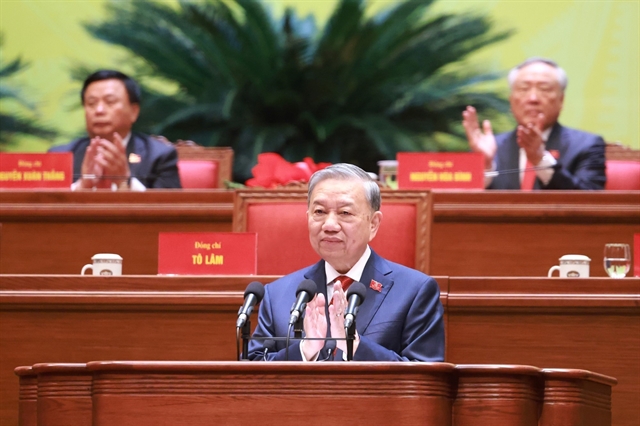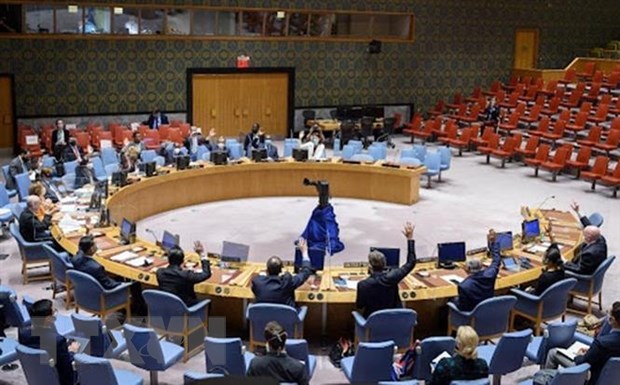 Politics & Law
Politics & Law

Minister Counsellor Nguyễn Phương Trà, Deputy Permanent Representative of Việt Nam to the United Nations (UN), on Thursday attended Arria-Formula Meeting on Hate Speech and Social Media of the UN Security Council, where she emphasised the need to raise public awareness of impacts from online hate speech in society.

|
| A meeting of the UN Security Council in New York. — THX/VNA Photo |
NEW YORK — Minister Counsellor Nguyễn Phương Trà, Deputy Permanent Representative of Việt Nam to the United Nations (UN), on Thursday attended the Arria-Formula Meeting on Hate Speech and Social Media of the UN Security Council, where she emphasised the need to raise public awareness of impacts from online hate speech in society.
Trà said it was necessary to develop communication and education programmes to equip social media users with skills to assess content and information on the internet.
Apart from addressing root causes like poverty and inequality as well as issues regarding transparency in governance, countries should review and build legal frameworks and policies on preventing incitement to hatred and strengthening national unity through dialogues and inclusive reconciliation, she suggested.
Tech firms that offer social media services and individuals also must be held accountable for preventing and easing the risks of online hate speech, according to the Vietnamese representative.
Trà proposed the UN step up its partnerships with all relevant sides, including governments, regional and international organisations, the private sector and other relevant parties in this regard.
Việt Nam always considers people the centre of development and consistently pursues a policy of equality, solidarity, and mutual respect and support for common progress, according to the diplomat.
All acts of discrimination and incitement to hatred and violence are banned in VIệt Nam.
At the meeting, participating countries shared concerns over the abuse of social media to incite hatred and violence, and threaten peace and security, both nationally and internationally.
Governments should take the main responsibility, they said, stressing the significant role of tech firms and social media in preventing and reducing impacts of the problem, they said.
The delegates also proposed a number of measures to enhance coordination between countries and international organisations and tech firms in this field.
Legal processes
The same day, Ambassador Phạm Hải Anh, Deputy Permanent Representative of Việt Nam to the UN, during his speech to the 76th UN General Assembly’s plenary meeting discussing the International Court of Justice (ICJ)’s annual report, emphasised that the peaceful settlement of international disputes is one of the basic principles of international law.
He also reaffirmed Việt Nam’s support for international legal processes, including those at the court.
Hải Anh said that countries can choose from a variety of dispute settlement methods under the provisions of the UN Charter, including the arbitration mechanism, and they have obligations to comply with and implement decisions and judgments of international jurisdiction agencies.
Việt Nam has contributed ideas to many legal processes at the ICJ, and hopes that the court will continue supporting the improvement of capacity of countries in using arbitration and jurisdiction mechanisms to resolve disputes.
Regarding the Trust Fund for the Judicial Fellowship Programme of the ICJ, Anh affirmed that Việt Nam expects the trust fund will come into operation soon to support law students graduating from developing countries to practise at the court, thus contributing to improving the international legal capacity of these countries.
According to ICJ President Judge Joan E. Donoghue the court has been seised of three new contentious cases since August 1, 2020, the starting date of the period covered by the report, and that the court has held hybrid hearings in nine cases and delivered five judgments during the same period. There are currently four cases under deliberation.
Donoghue noted that the court’s docket remained full, with 15 contentious cases currently pending before it “involving States from all regions of the world and touching on a wide range of issues, including territorial and maritime delimitation, the status of international watercourses, reparations for internationally wrongful acts, and alleged violations of bilateral and multilateral treaties concerning, among other things, diplomatic relations, the elimination of racial discrimination, the prevention of genocide and the suppression of terrorism financing”.
Representatives from more than 60 countries also delivered speeches at the event, in which they affirmed that the ICJ had an important role in the peaceful settlement of disputes through adjudicating cases between states and providing advisory opinions at the request of the UN General Assembly, the UN Security Council and several UN agencies under the provisions of the UN Charter. Through its judicial function, the court had made an important contribution to promoting the observance of the UN Charter and international law, and to sustainable development, peace, security, and stability in the world. — VNS